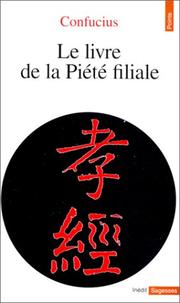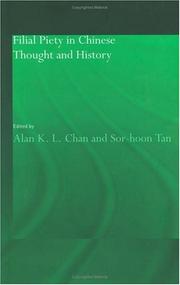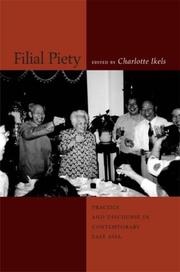| Listing 1 - 5 of 5 |
Sort by
|

ISBN: 2020313103 9782020313100 Year: 1998 Volume: 131 Publisher: Paris Seuil
Abstract | Keywords | Export | Availability | Bookmark
 Loading...
Loading...Choose an application
- Reference Manager
- EndNote
- RefWorks (Direct export to RefWorks)
Book
ISBN: 9782020989800 2020989808 Year: 2009 Publisher: Paris : Seuil,
Abstract | Keywords | Export | Availability | Bookmark
 Loading...
Loading...Choose an application
- Reference Manager
- EndNote
- RefWorks (Direct export to RefWorks)
Book
ISBN: 9780824832841 9780824833480 0824832841 0824833481 0824864638 0824869958 1441620206 Year: 2009 Publisher: Honolulu, Hawaii University of Hawai'i Press
Abstract | Keywords | Export | Availability | Bookmark
 Loading...
Loading...Choose an application
- Reference Manager
- EndNote
- RefWorks (Direct export to RefWorks)
Few if any philosophical schools have championed family values as persistently as the early Confucians, and a great deal can be learned by attending to what they had to say on the subject. In the Confucian tradition, human morality and the personal realization it inspires are grounded in the cultivation of family feeling. One may even go so far as to say that, for China, family reverence was a necessary condition for developing any of the other human qualities of excellence. On the basis of the present translation of the Xiaojing (Classic of Family Reverence) and supplemental passages found in other early philosophical writings, Professors Rosemont and Ames articulate a specifically Confucian conception of "role ethics" that, in its emphasis on a relational conception of the person, is markedly different from most early and contemporary dominant Western moral theories. This Confucian role ethics takes as its inspiration the perceived necessity of family feeling as the entry point in the development of moral competence and as a guide to the religious life as well.In the lengthy introduction, two senior scholars offer their perspective on the historical, philosophical, and religious dimensions of the Xiaojing. Together with this introduction, a lexicon of key terms presents a context for the Xiaojing and provides guidelines for interpreting the text historically in China as well as suggesting its contemporary significance for all societies. The inclusion of the Chinese text adds yet another dimension to this important study. The Chinese Classic of Family Reverence is sure to appeal to specialists of comparative and Chinese philosophy and to all readers interested in the enduring importance of the family
Philosophy --- China --- Ethics --- S12/0370 --- Ethics, Chinese --- China: Philosophy and Classics--Xiaojing 孝經 --- Xiao jing. --- Hsiao ching --- Hyogyŏng --- Si︠a︡o t︠s︡zin --- Hiao-king --- Book of filial piety --- Heaou king --- Syau Jing --- Achlalt nom --- Kniga synovneĭ pochtitelʹnosti --- 孝經 --- Confucian ethics --- Confucian sociology

ISBN: 0415333652 Year: 2004 Publisher: New York (N.Y.): RoutledgeCurzon
Abstract | Keywords | Export | Availability | Bookmark
 Loading...
Loading...Choose an application
- Reference Manager
- EndNote
- RefWorks (Direct export to RefWorks)
S12/0375 --- S12/0370 --- Filial piety --- -Conduct of life --- Ethics, Practical --- Morals --- Personal conduct --- Ethics --- Philosophical counseling --- Filial love --- Piety, Filial --- Conduct of life --- Parent and child --- Piety --- China: Philosophy and Classics--Filial piety --- China: Philosophy and Classics--Xiaojing 孝經 --- Conduct of life.

ISBN: 0804747911 0804747903 Year: 2004 Publisher: Stanford (Calif.): Stanford university press
Abstract | Keywords | Export | Availability | Bookmark
 Loading...
Loading...Choose an application
- Reference Manager
- EndNote
- RefWorks (Direct export to RefWorks)
How have rapid industrial development and the aging of the population affected the expression of filial piety in East Asia? Eleven experienced fieldworkers take a fresh look at an old idea, analyzing contemporary behavior, not norms, among both rural and urban families in China, Japan, Korea, and Taiwan. Each chapter presents rich ethnographic data on how filial piety shapes the decisions and daily lives of adult children and their elderly parents. The authors' ability to speak the local languages and their long-term, direct contact with the villagers and city dwellers they studied lend an immediacy and authenticity lacking in more abstract treatments of the topic. This book is an ideal text for social science and humanities courses on East Asia because it focuses on shared cultural practices while analyzing the ways these practices vary with local circumstances of history, economics, social organization, and demography and with personal circumstances of income, gender, and family configuration.
S12/0375 --- S12/0370 --- Kinship --- -Family --- -Households --- Parent and adult child --- -Filial piety --- -Adult children of aging parents --- -Aging parents --- -Elderly parents --- Parents, Aged --- Parents --- Sandwich generation --- Aging parents' adult children --- Children of aging parents --- Aging parents --- Filial love --- Piety, Filial --- Conduct of life --- Parent and child --- Piety --- Adult child and parent --- Adult children and parents --- Parent-adult child relations --- Parents and adult children --- Adult children living with parents --- Population --- Families --- Home economics --- Family --- Family life --- Family relationships --- Family structure --- Relationships, Family --- Structure, Family --- Social institutions --- Birth order --- Domestic relations --- Home --- Households --- Marriage --- Matriarchy --- Parenthood --- Patriarchy --- Ethnology --- Clans --- Consanguinity --- Kin recognition --- China: Philosophy and Classics--Filial piety --- China: Philosophy and Classics--Xiaojing 孝經 --- Care --- -Social aspects --- Social conditions --- East Asia --- -Asia, East --- Asia, Eastern --- East (Far East) --- Eastern Asia --- Far East --- Orient --- Social life and customs --- Adult children of aging parents --- Filial piety --- Social life and customs. --- Social aspects --- Asia, East
| Listing 1 - 5 of 5 |
Sort by
|

 Search
Search Feedback
Feedback About UniCat
About UniCat  Help
Help News
News